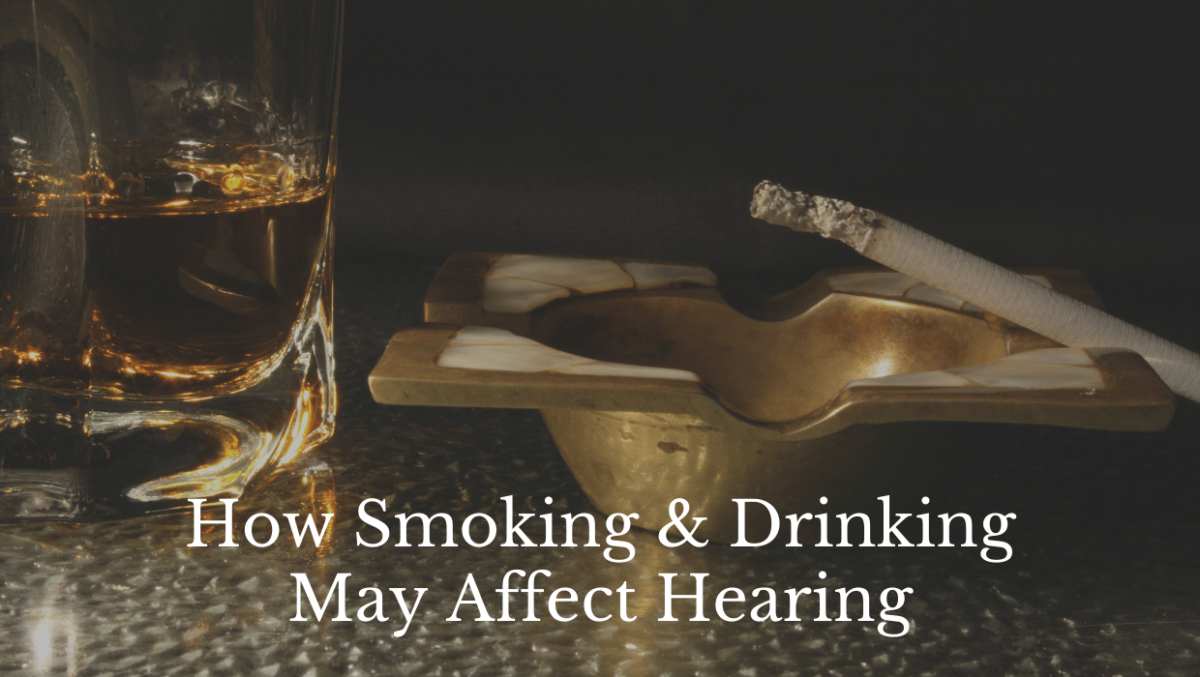
How Smoking & Drinking May Affect Hearing
You may think the smoking, drinking and loud music make you the life of the party, but at the end of the night, your health and your hearing won’t be thanking you. Most people know that loud music can damage your hearing, but it is less well known that smoking and drinking can also take a toll on your ears.
However, just as cigarettes and alcohol can damage your overall health, your auditory system can suffer as well. Research is now supporting that both smoking and second-hand smoke exposure can harm your ability to hear, as well as excessive drinking. Let’s take a closer look at how these substances act on the auditory system – and their potential to harm our hearing.
Smoking and Hearing
Statistics show a solid link between smokers and increased rates of hearing loss. Understanding a little about how the sense of hearing works helps us see where the connection between smoking and hearing may lie.
To hear, the human ear collects soundwaves from the surrounding air. These sound waves travel through the ear canal and vibrate the eardrum which sends the sound wave into the inner ear. Throughout the inner ear the sound wave activates tiny sensory cells called “hair cells” which are responsible for translating the sound wave signal into electrical impulses sent to the brain.
Our hearing relies on tiny structures of the hair cells. These cells are critical to our hearing, but if they become damaged they can neither replace nor repair themselves. Non-functional hair cells decrease our ability to detect sounds. The more hair cells that are out of commission, the greater degree of hearing loss present.
Smoking can impact your hearing by restricting blood flow to the inner ear. Hair cells are fed by a network of small blood vessels. Like the hair cells themselves, these blood vessels are very small and delicate. Smoking constricts your blood vessels, making proper blood circulation more difficult. Small blood vessels, like those in the inner ear, may be largely cut off from proper blood flow, receiving only limited circulation.
When there isn’t enough blood reaching the hair cells, they are essentially being starved. Blood delivers oxygen and nutrients the cells need to stay healthy and function. When the hair cells become malnourished by limited blood flow, permanent damage to the cells can occur. This increased vulnerability to hair cells damage translates to an increased risk of hearing loss.
Any amount of smoking comes with lasting health consequences and being around secondhand smoke can also damage your health and hearing in ways similar to being a smoker. Although quitting is difficult, eliminating a cigarette habit is one of the best things you can do for your health.
Drinking and Hearing
The relationship between alcohol and hearing loss is more nuanced. Unlike cigarettes which have a direct restrictiveness to cardiovascular health, alcohol interacts with the cardiovascular system in different ways depending on how much alcohol is consumed. Cardiovascular health issues adversely affect hearing health, in large part because it causes issues with blood flow to the inner ear.
Low and occasional alcohol consumption has very little effect on hearing health, according to research. Studies have also assessed moderate and heavy drinking levels. Moderate alcohol consumption – one or two drinks per day – has been shown to have a beneficial effect on cardiovascular health because it can encourage HDL cholesterol and reduces coagulation. By supporting cardiovascular health, moderate drinking may have a slight beneficial effect on hearing.
Heavy drinking patterns however do not have the same outcome. Heavy drinking does not support HDL cholesterol production and can encourage clotting. It also reduces activity levels in the heart. Heavy drinking has generally been shown to have an adverse effect on many systems in the body, including cardiovascular health. Through impacting cardiovascular activity, the effects of heavy drinking can ripple into your hearing health and make you more vulnerable to hearing loss.
Hearing Health
Your total health supports your hearing health. Eating right, exercising and avoiding loud noise are all great ways to support the small, delicate cells your hearing depends upon. Eliminating cardiovascular risk factors is another way to support your hearing. Quitting smoking and avoiding smoke-filled areas as well as eliminating heavy drinking are great ways to improve your overall health and minimize hearing damage.
